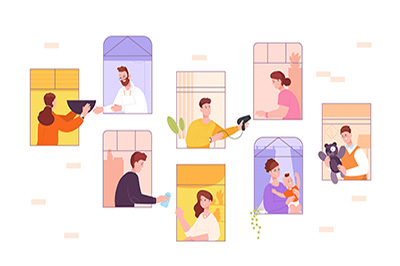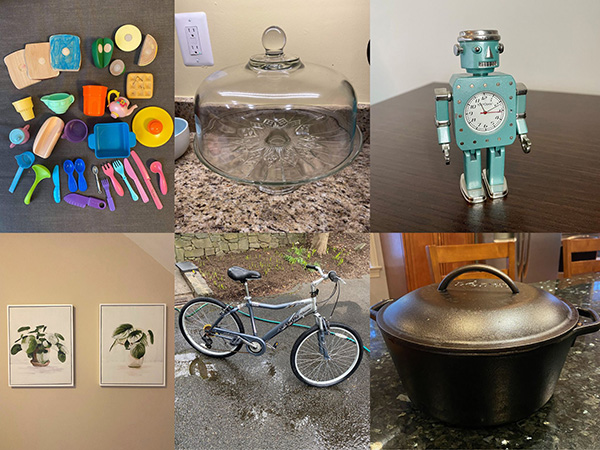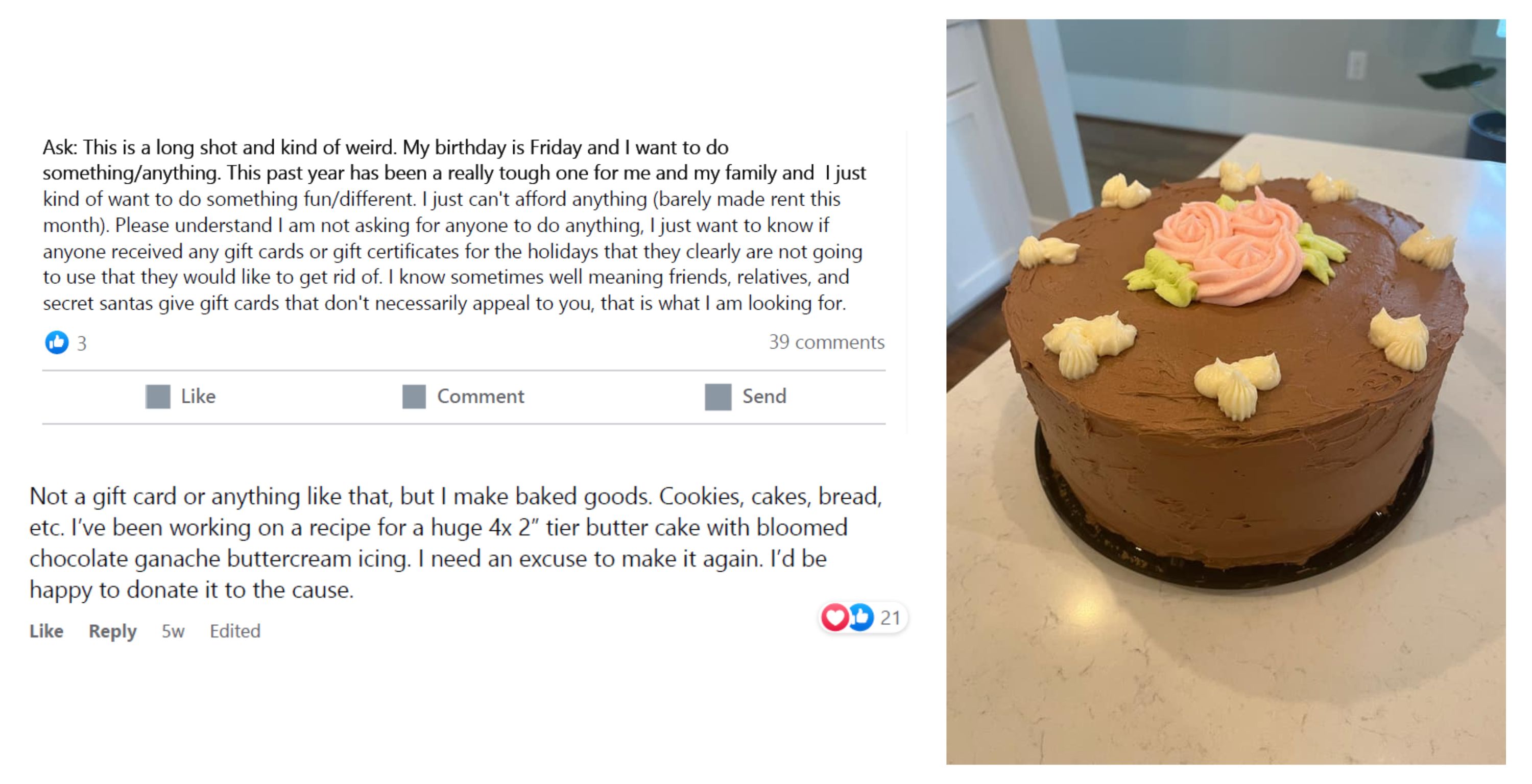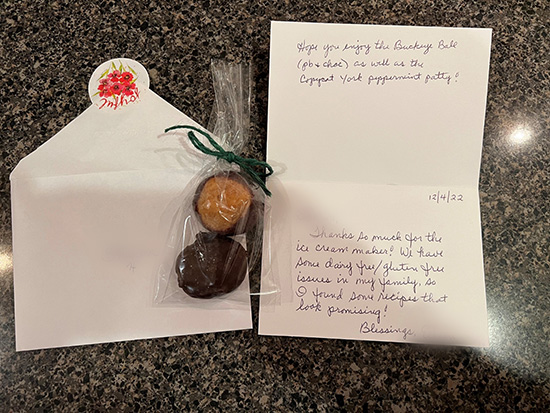Last updated May 2023
The Good, the Bad, and the Weird of the Gift Economy
As we discuss in our advice on buying used stuff, when you acquire secondhand belongings, you not only save money but also help the environment.
While most consumers have always shared their unwanted possessions with friends and relatives, online resources now help neighbors connect with one another to avoid waste.
 Deron Beal started The Freecycle Network in 2003 when he couldn’t find a place to recycle a perfectly good bed. The website started as a small group of friends and has grown to over 10 million members in 5,000 online communities across 110 countries. Volunteers moderate the groups, and Beal estimates members kept more than 807 million pounds of used items out of landfills in the last year alone.
Deron Beal started The Freecycle Network in 2003 when he couldn’t find a place to recycle a perfectly good bed. The website started as a small group of friends and has grown to over 10 million members in 5,000 online communities across 110 countries. Volunteers moderate the groups, and Beal estimates members kept more than 807 million pounds of used items out of landfills in the last year alone.
Similarly, the Buy Nothing Project began in 2013 when friends Rebecca Rockefeller and Liesl Clark created an experimental gift economy on Bainbridge Island, Wash. It has since expanded to 6.5 million members and 7,500 communities, which are also moderated by volunteers. Buy Nothing communities typically have smaller geographic boundaries than Freecycle groups; members join via the Buy Nothing app or a Facebook group.
“What people don’t realize is thrift stores such as Goodwill have to dispose of over two-thirds of all donations because they can’t resell them,” Beal said. “Freecycle fills a huge niche between monetary value and actual value. There’s plenty of stuff that’s got good use left but isn’t worth anything anymore. If you get a little creative—like if you need a printer—you can ask for one on Freecycle.”
Some Things in Life Really Are Free
In 2021, Dorcas Emma Robinson of Silver Spring, Md., issued herself a challenge: Buy nothing new for one year except food, beauty, and health products; appliances and home repair services; and a few items she couldn’t find in neighborhood gifting groups, such as a calculator and a pair of running shoes.
“I’ve been in places where I’ve seen people live happily with nothing, treasuring one book,” Robinson said. “I think we live these insulated lives where we think, ‘I have money, I can go on Amazon and buy this.’ You need something to stop you.”
In addition to avoiding buying new, Robinson gave away dozens of items through her Buy Nothing Project group, including furniture, a serving dish for chips and dip, CDs with software for French lessons, camping equipment, kids’ sporting goods, a patio table and two chairs, a grill, and lots of books.
Though she is no longer as strict with her bid to buy nothing, Robinson has continued to give things away.
“I have a lot of stuff in my life; I’m not even a shopper,” Robinson said. “I have stuff from my daughter’s babyhood—she’s 20 now—and that takes you into the loop of, ‘Well, I have to stop getting stuff.’”
Beal has seen unusual things given away through Freecycle: an engagement ring from a would-be bride who found out her fiancé was cheating; a 100-year-old Arkansas house—with the caveat that its recipient had to move it off the property themselves.
Crescent Moegling, a founding member of the Buy Nothing Project, said in her 10 years with the organization she’s seen major gifts including boats, cars, and even vacations.
 We polled Checkbook’s staff and members about what they have given and received through local gifting groups, including Freecycle, Buy Nothing, neighborhood listservs, Facebook groups, Craigslist’s free pages, or Nextdoor. A sampling of their activity:
We polled Checkbook’s staff and members about what they have given and received through local gifting groups, including Freecycle, Buy Nothing, neighborhood listservs, Facebook groups, Craigslist’s free pages, or Nextdoor. A sampling of their activity:
- Outgrown baby essentials, from clothes, toys, and books to a bassinet and recliner
- Bikes and exercise equipment
- Books and DVDs
- Cardboard boxes and bubble wrap for moving and storage needs
- Old desktop computers, especially for playing retro games
- Food items, often when misdelivered through online orders or that wouldn’t be eaten before expiration
- Furniture and home décor (one Checkbook staffer gave two lamps and a mirror to a neighbor who was helping refugees settle into an apartment)
- Holiday decorations, including artificial trees, garlands, ornaments, and Halloween costumes
- Kitchen gadgets, from an air fryer to an immersion blender to a microwave
- Plant cuttings
- Puzzles through a game-swap group
- Borrowed tools
- Fifty plastic newspaper-delivery sleeves for a woman who fosters dogs and used them as waste bags
Many freebie givers said they enjoyed hearing stories about how recipients would give their old items new lives. And while a few commented on the money they’ve saved by taking in used items from neighbors, they more often were relieved to get stuff out of their homes.
Buy Nothing, Gain a Community
Groups like The Freecycle Network and the Buy Nothing Project differ from other free-gift sites by striving to create community.
Beal said that during disasters people often use Freecycle to come together—for example, offering supplies for victims of Hurricane Katrina in 2005 and support to families in need during the COVID-19 pandemic. “People would hang homemade masks on trees and invite others to come get them,” he said.
With Buy Nothing groups, gifting isn’t limited to secondhand stuff. Andrea Densmore, Checkbook’s managing editor, recalled that a neighbor in her group asked for a little birthday cheer after falling on hard times.
“I had been sitting on a $50 gift card to a restaurant, so I gave that to her,” Densmore said. “But another guy made her a birthday cake, and she got tons of suggestions on places that give away free stuff.”

Gratitude often goes hand-in-hand: After my parents gave away an ice cream maker received as a wedding present in the 1980s, the recipient left a handwritten thank-you card and some home-baked treats.
Robinson herself has offered to share knowledge and time to teach her neighbors about composting. And when she had knee surgery and posted a request to borrow a cane, someone offered to bring it straight to her house.
“That’s what I think is so cool about Buy Nothing,” Robinson said. “It might be someone you don’t know or talk to, and you just connect.”

Some Trouble with Volunteer Admins
The system isn’t always perfect. Wannabe gifters sometimes complain about “no shows,” difficulty using Freecycle’s platform, too-narrow geographic boundaries that exclude neighbors along racial or socioeconomic lines, and needing a Facebook profile to access some other groups. But more common complaints are directed at Buy Nothing’s volunteer moderators, who don’t apply rules consistently from group to group.
A guideline on Buy Nothing’s main website is to “Build a Shared Narrative” within individual communities. That means keeping a record of all items given. But we noticed that at least one neighborhood’s Buy Nothing group required that gifted posts be deleted—a contradiction to the mission.
Another group we checked asks members to blur out brand names before posting photos—with the idea that no one should be able to determine the gift’s monetary value. “Sometimes the brand name can be important. Not all brands of diapers work well for every kid,” Densmore noted.
And that hazier concept of gifting time, talent, or “less tangible things” that Buy Nothing lists under its explanation of “stuff” can be left to interpretation.
I spoke with Donna V., a Checkbook member who was banned from her group over a difference of opinion. She had been giving and getting items for more than a year when she posted a wish for advice on how to pot a seed that had sprouted in water.
“The rules include examples of asking for help, knowledge, ‘anything a neighbor would do for a neighbor,’ and I think advice about how to do something falls into that category,” Donna said. “But the admin disagreed and deleted my post.”
When Donna privately messaged the admin to ask why her post was removed, they referred to the rules, specifically that she could, for example, “ask someone… to show you how to make banana bread.”
“That seems a lot like asking someone to tell you how to pot a seedling,” she said. “So it was a wording issue. I had to find the specific, admin-approved words to ask or wish for the gift of knowledge or whatever it was.”
A few weeks later, another member of the group posted a wish for advice about her daughter’s recent celiac diagnosis.
“People were commenting, offering recipes, and then the post and comments disappeared,” Donna said. “And the original poster made another post, asking why the first one had been deleted. So I told her the admins don’t allow requests for advice. She said, ‘But the rules say you can.’ And I agreed.”
Not long after, Donna was kicked out of her Buy Nothing group when the moderators determined she opposed the Buy Nothing mission. She was invited to submit a request to join again in 30 days, but she instead has embraced Freecycle and other splinter Buy Nothing groups made up of former members banned for similar reasons.
When Checkbook asked about these discrepancies, Buy Nothing’s Moegling said, “The majority of the groups adhere to the Buy Nothing 10 Rules. Some groups choose to add new rules or best practices to serve their own local communities in specific ways.”
How to Get Involved
It takes some effort to find places for your unwanted stuff, but many of our staff and members have found participating in these communities to be rewarding.
Before searching for something or listing an item, consider these ground rules:
- Read and follow the group’s guidelines. As mentioned above, some are sticklers. If you’re not sure, ask an administrator.
- Clean your stuff beforehand—wash clothes and kitchen items, wipe down toys, etc. A little effort will be appreciated.
- For posts you share, include pics and measurements, disclose if it’s broken, and list pickup details.
- Say “Please” and “Thank you!” Too many folks we spoke with commented that some recipients were disappointingly rude.
- If you’re picking up an item, take a friend along or meet in a public space. Many police stations provide safe areas for these exchanges.
- Don’t be insulted if no one wants your stuff. Try, try again.
- Once the item has been picked up, promptly update your listing to let others know it’s been taken.
- If you’re looking to clear out a lot of stuff, creating dozens of giveaway posts won’t necessarily be the most efficient way to do that—it takes work to list multiple items and schedule pickups.
For more advice, see our section Getting Rid of Your Unwanted Stuff.


